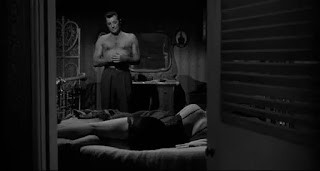by A.J.
Night 3: Thriller Night
“You still don’t get it, do you, counselor?”
The original classic Cape Fear is a thriller, not a horror movie, but there is enough suspense and deep dread to make it a great alternative to bloody slashers or graphic horror movies. Little about it is dated; there are scenes that will make your skin crawl. The two elements that make Cape Fear so effective are the powerful, ominous score by the legendary Bernard Herrmann and the chilling performance of Robert Mitchum as one of the screen's most sinister and dangerous villains: Max Cady.
In the same year that the great Gregory Peck played the upstanding, righteous southern lawyer Atticus Finch in To Kill a Mockingbird, he also played another upstanding, righteous southern lawyer, the admittedly less memorable Sam Bowden, in Cape Fear. Seemingly out of the blue, Sam finds himself and his family stalked and menaced by Max Cady, who recently completed an 8 year prison sentence and blames Sam for testifying against him. Even though Cady is a violent man, his revenge is slow and insidious and skirts the edges of the law. As Cady’s menace grows, so does the question of how far Sam will go–whether or not he will break the law–to protect his family.
In the making-of featurette on the Blu-ray, Peck says, "I played a good guy. More or less a predictable guy… When [Cady] walked into a scene everyone was on guard, so to speak, wondering what he might do next." He knew that even though he was playing the hero, he was not really the lead of the movie. Whoever was cast as Max Cady would be the lead and Robert Mitchum really is the star of the movie. He plays Cady as someone who is a brute and is also clever. He enjoys the psychological torment he inflicts as well as physical violence. His menace and danger grows subtly until at the climax when he more or less becomes a primordial force emerging from the waters of the Cape Fear River. Mitchum gets to show off with low key scenes and also in more confrontational scenes but he never goes over the top. The scariest thing about this character is how believable Mitchum makes him.
It seems that Cady lives for only one reason, which is to take revenge on Sam. Despite never directly stating it, because of Production Code censorship, director J. Lee Thompson still makes it clear that Cady’s revenge plan is to torture and rape Sam’s wife and young daughter. By far the most uncomfortable scene in the movie is Cady standing on a pier eating ice cream and watching Sam's daughter clean their boat. Cady tells Sam that his daughter is almost as juicy as his wife. Sam punches him but Cady does not fight back and there is now a whole pier full of witnesses to Sam hitting him first. In another scene, shocking only because it is in a movie made in 1962, Cady uses his sinister charm to seduce a woman who he later rapes and beats (offscreen) knowing that she won't file charges or testify because it would mean recounting and explaining the details of the assault publicly. Cady does this merely to demonstrate what he is capable of. Thompson walked a tightrope with the censors with scenes like this in addition to scenes of actual physical violence.
Early in his career, Thompson worked with Hitchcock and often approached a scene by asking himself what Hitchcock would have done. He makes great use of suspense, letting the audience know what the characters do not. He also includes some fake-out jump scares, like Sam's wife being startled by a hatrack in the shadows late at night. A much more consequential fake out happens later in the movie.
When Thompson was asked if had any objections to hiring Bernard Herrmann to compose the score, his response was, "I should think not!" Herrmann, who had already composed memorable scores for Hitchcock's Vertigo, North by Northwest, and Psycho, created another ominous and evocative score. It still packs a punch with its powerful horns and suspenseful strings. Like Herrmann’s most famous scores, there's a good chance that you've heard it even if you haven't seen the movie. When Martin Scorsese remade Cape Fear in 1991, he reused much of Herrmann's original score.
This might sound like a pro-vigilante or “extra-legal” justice movie. After all, the law keeps failing the upstanding citizen and protecting the outsider instead, but ultimately this is not a cynical movie. I must admit I was reminded of the idealistic duel played by Batman and the Joker in Christopher Nolan's The Dark Knight. The Joker and Cady essentially have no goal other than to cause pain and destruction and goad their opponents into breaking their moral codes. If Batman or Sam breaks their code to defeat and punish their antagonist, then they have lost. Of course, Peck's Sam is much less exciting than Batman.
Peck also worked as a producer on film and even chose the source material, a pulp novel by John D. MacDonald titled The Executioners. He chose a new title by looking at a map until he found an interesting name because sometimes, he said, “geographical titles” were successful like Casablanca or Dodge City. I think only the Coen brothers with Fargo have had as much success with picking a random city as the title of their movie. Cape Fear (1962) is airing on TCM on Sunday, October 27th at 1AM CT. It is also available to stream on Prime Video.









No comments:
Post a Comment